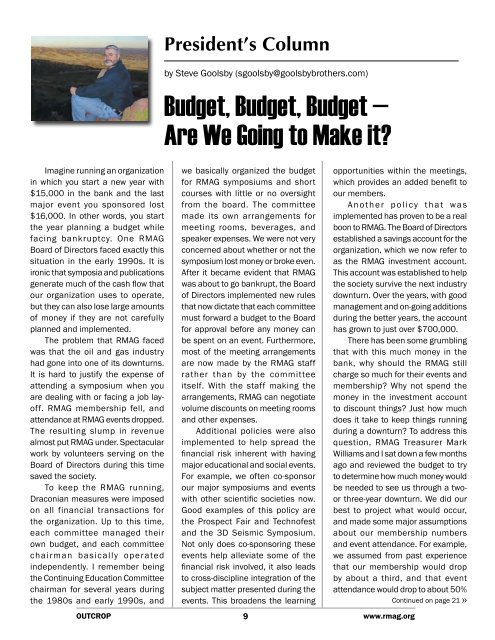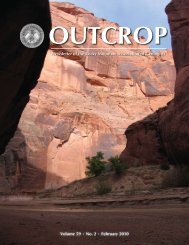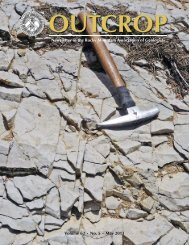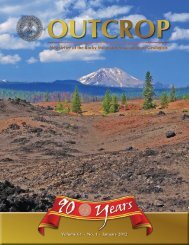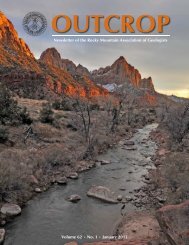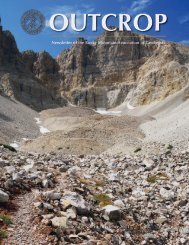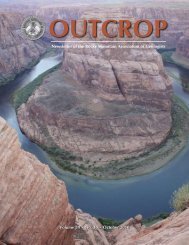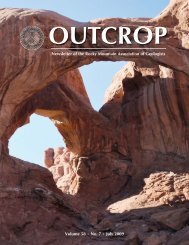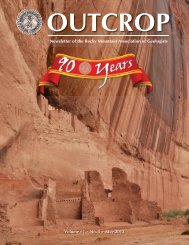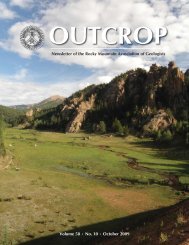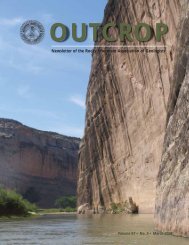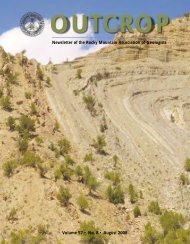February 2008 - Rocky Mountain Association of Geologists
February 2008 - Rocky Mountain Association of Geologists
February 2008 - Rocky Mountain Association of Geologists
You also want an ePaper? Increase the reach of your titles
YUMPU automatically turns print PDFs into web optimized ePapers that Google loves.
President’s Column<br />
by Steve Goolsby (sgoolsby@goolsbybrothers.com)<br />
Budget, Budget, Budget —<br />
Are We Going to Make it?<br />
Imagine running an organization<br />
in which you start a new year with<br />
$15,000 in the bank and the last<br />
major event you sponsored lost<br />
$16,000. In other words, you start<br />
the year planning a budget while<br />
facing bankruptcy. One RMAG<br />
Board <strong>of</strong> Directors faced exactly this<br />
situation in the early 1990s. It is<br />
ironic that symposia and publications<br />
generate much <strong>of</strong> the cash flow that<br />
our organization uses to operate,<br />
but they can also lose large amounts<br />
<strong>of</strong> money if they are not carefully<br />
planned and implemented.<br />
The problem that RMAG faced<br />
was that the oil and gas industry<br />
had gone into one <strong>of</strong> its downturns.<br />
It is hard to justify the expense <strong>of</strong><br />
attending a symposium when you<br />
are dealing with or facing a job lay<strong>of</strong>f.<br />
RMAG membership fell, and<br />
attendance at RMAG events dropped.<br />
The resulting slump in revenue<br />
almost put RMAG under. Spectacular<br />
work by volunteers serving on the<br />
Board <strong>of</strong> Directors during this time<br />
saved the society.<br />
To keep the RMAG running,<br />
Draconian measures were imposed<br />
on all financial transactions for<br />
the organization. Up to this time,<br />
each committee managed their<br />
own budget, and each committee<br />
chairman basically operated<br />
independently. I remember being<br />
the Continuing Education Committee<br />
chairman for several years during<br />
the 1980s and early 1990s, and<br />
OUTCROP<br />
we basically organized the budget<br />
for RMAG symposiums and short<br />
courses with little or no oversight<br />
from the board. The committee<br />
made its own arrangements for<br />
meeting rooms, beverages, and<br />
speaker expenses. We were not very<br />
concerned about whether or not the<br />
symposium lost money or broke even.<br />
After it became evident that RMAG<br />
was about to go bankrupt, the Board<br />
<strong>of</strong> Directors implemented new rules<br />
that now dictate that each committee<br />
must forward a budget to the Board<br />
for approval before any money can<br />
be spent on an event. Furthermore,<br />
most <strong>of</strong> the meeting arrangements<br />
are now made by the RMAG staff<br />
rather than by the committee<br />
itself. With the staff making the<br />
arrangements, RMAG can negotiate<br />
volume discounts on meeting rooms<br />
and other expenses.<br />
Additional policies were also<br />
implemented to help spread the<br />
financial risk inherent with having<br />
major educational and social events.<br />
For example, we <strong>of</strong>ten co-sponsor<br />
our major symposiums and events<br />
with other scientific societies now.<br />
Good examples <strong>of</strong> this policy are<br />
the Prospect Fair and Techn<strong>of</strong>est<br />
and the 3D Seismic Symposium.<br />
Not only does co-sponsoring these<br />
events help alleviate some <strong>of</strong> the<br />
financial risk involved, it also leads<br />
to cross-discipline integration <strong>of</strong> the<br />
subject matter presented during the<br />
events. This broadens the learning<br />
9<br />
opportunities within the meetings,<br />
which provides an added benefit to<br />
our members.<br />
A n other p o l i c y t h a t was<br />
implemented has proven to be a real<br />
boon to RMAG. The Board <strong>of</strong> Directors<br />
established a savings account for the<br />
organization, which we now refer to<br />
as the RMAG investment account.<br />
This account was established to help<br />
the society survive the next industry<br />
downturn. Over the years, with good<br />
management and on-going additions<br />
during the better years, the account<br />
has grown to just over $700,000.<br />
There has been some grumbling<br />
that with this much money in the<br />
bank, why should the RMAG still<br />
charge so much for their events and<br />
membership? Why not spend the<br />
money in the investment account<br />
to discount things? Just how much<br />
does it take to keep things running<br />
during a downturn? To address this<br />
question, RMAG Treasurer Mark<br />
Williams and I sat down a few months<br />
ago and reviewed the budget to try<br />
to determine how much money would<br />
be needed to see us through a twoor<br />
three-year downturn. We did our<br />
best to project what would occur,<br />
and made some major assumptions<br />
about our membership numbers<br />
and event attendance. For example,<br />
we assumed from past experience<br />
that our membership would drop<br />
by about a third, and that event<br />
attendance would drop to about 50%<br />
Continued on page 21 »<br />
www.rmag.org


